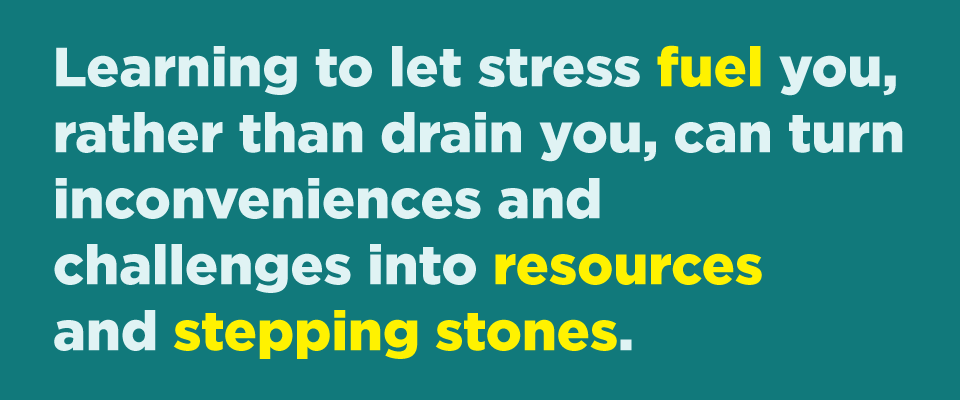It’s time to break the myth: there is no such thing as a stress-free life. We know, what a buzzkill.
But think about it. Even if you were lounging in a cabana on a Caribbean island, holding a tropical cocktail with a tiny umbrella, something would still stress you out. You get a sunburn, or the bar runs out of margarita mix. Living without stress is impossible—and according to one
expert, it shouldn’t even be the goal.
“Even people who report relatively little stress believe that the ideal level of stress is below whatever they’re currently experiencing,” says
Kelly McGonigal, a health psychologist and lecturer at Stanford University. That’s because, she explains, “stress is what arises when something you care about is at stake.”
So, completely eradicating stress would require dismissing everything you care about: friends, family, career, margaritas...Does that sound like a fair trade? Of course not. According to McGonigal, the goal shouldn’t be to eliminate stress, but to embrace it. And while that seems counterintuitive, science actually backs it up.
In her book,
The Upside of Stress, McGonigal challenges traditional notions of stress as
harmful and toxic. Instead, she argues that stress is our body’s natural mechanism for enhancing performance under pressure, fostering social connections, and promoting resilience and growth.
Table of Contents
Change Your Perspective
“It might feel weird to think about having a relationship with stress, especially if you’re used to thinking of stress as something that happens to you,” McGonigal writes. But the “latest science reveals that stress can make you smarter, stronger, and more successful.” Basically, everything you ever knew about stress is wrong.
How do you tap into the magical powers of stress? The key is
perspective. If you think stress is harmful, it can harm. But if you think of stress as helpful, it will help you. McGonigal calls this the mindset effect—the outcome you expect is the outcome you get.
How to Turn Bad Stress into Good Stress
It can be hard to
start seeing stress as your friend. We’ve been conditioned to avoid it or escape it. Luckily, we can unlearn what we’ve been taught about stress. It just takes practice.
Making a U-turn on stress requires what McGonigal calls a mindset reset: shifting the core beliefs that shape your reality, ultimately transforming how you think and react to different aspects of your life.
Mindset resets can be big changes or small tweaks to re-train your body’s response to stress: what you say, what you do, or how you interact with others. The best part about these resets is that they “don’t just stick; they also snowball,” says McGonigal. “Every time [people] perform well despite—or perhaps because of—their nerves, they learn to trust themselves under pressure.”
How to Reframe Common Stressors
Our jobs pose seemingly endless varieties of stressful situations.
Depending on your field and specific job, you could encounter anything from physical threat—such as police officers or medical professionals—to
psychological strain—like stockbrokers and C-suite executives. McGonigal outlines the most common types of stressors we face, and the surprising changes you can make to embrace and transform your stress.
Threatened
- If you feel...threatened
- You should...use it as a call to action
- Because...that’s exactly what our stress responses are designed to do. At a biological level, they help us spring into action to protect our offspring. In the working world, stress responses help us instigate change to defend our dreams and aspirations. As McGonigal explains, “We get stressed when our goals are on the line, so we take action.” In other words, don’t let an unraveling project slow you down—let it fuel you to course-correct and move forward.
Anxious
- If you feel...anxious.
- You should...channel that energy.
- Because...Studies show that we actually perform better under pressure when we’re stressed. McGonigal points to athletes as evidence: before a major game, they often refer to their stress as “being amped up.” (If you need some examples or inspiration, just watch SportsCenter for an hour). Why not translate that to the conference room? Rather than feel nervous before a major presentation, get pumped up!
Overwhelmed
- If you feel...overwhelmed.
- You should...help other people.
- Because...“When individuals feel time-constrained, they should become more generous with their time, despite their inclination to be less so,” says McGonigal, citing research from the University of Pennsylvania. Ummm...what? When I’m buried under a pile of emails, the last thing I want to do is help my cubemate with his work. So what gives? Paying it forward is a proven mood-booster, triggering the part of your brain that produces feelings of resilience, which can make you more focused and productive.
Impostor
- If you feel...like an impostor.
- You should...find the bigger picture.
- Because...As cheesy as it sounds, there is no "I" in "team". Ambitions are rarely achieved in isolation, and trying to work alone is often just lonely. Try taking a step back. Set aside your immediate needs. Embrace the support of your community. When you channel your efforts into something bigger, rather than something on my to-do list, studies show that you work just as hard, and actually become more liked and well-respected by people in your network.
Defeated
- If you feel...defeated.
- You should...try to learn from it.
- Because...“Growth is not a rare phenomenon reported only by exceptional people,” writes McGonigal, quoting a study on post-trauma resilience. This isn’t an endorsement for suffering. Rather, it’s an invitation to embrace the bad with the good. The ability to see positives and negatives is associated with better long-term outcomes, since it allows you to simultaneously learn from mistakes and better identify areas of opportunity. If your boss gives you some critical or negative feedback, try to listen and find the deeper meaning that will actually help you improve.
McGonigal says that “embracing stress is a radical act of
self-trust.” And she’s right—none of these tactics will completely eliminate stress from your life. You will face crazy deadlines. You will get critical
feedback from your boss. You will (eventually) run out of margarita mix. But learning to let stress fuel you, rather than drain you, can turn inconveniences and challenges into resources and stepping stones. So buck the trend, break the myth, and start rebelling against everything you ever knew about stress.












